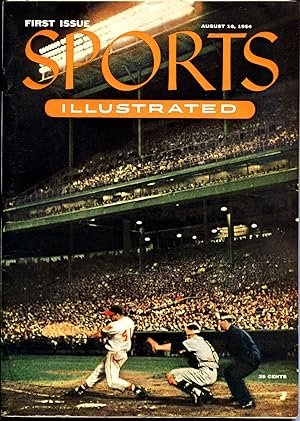A sad sigh for SI
/ARCHIVED SCREENSHOT OF THE BIO OF A SPORTS ILLUSTRATED ONLINE WRITER WHO DOESN’T EXIST. THE BIO OMITS THAT DREW SPENDS MOST OF HIS OUTDOORS TIME LOOKING FOR BIGFOOT.
Update (March 21, 2024): Authentic Brands Group has dumped The Arena Group and will license publishing rights for SI for at least 10 years to Minute Media, which says it will continue the print version of the magazine.
Update (Dec. 12): The Arena Group fired its CEO.
Update (Dec. 7): Futurism reported Dec. 6 that The Arena Group fired two top executives, though Arena claimed that was unrelated to this controversy. Sorry, I don’t buy that last part.
In my UA office, a leaping Sidney Moncrief is about to slam home a basketball. The photo of the former University of Arkansas star adorns the cover of the Feb. 13, 1978 issue of Sports Illustrated magazine. I display it because it contains a letter to the editor I wrote, and lemme tell ya, that was a thrill for a dumb college kid.
Not just because it was a national publication, but also because the magazine owned by Time Inc. represented the best of sports writing and photography. From its founding in 1954, it became the iconic sports publication for six decades.
That’s done with.
Another black mark in the sad demise of the magazine – and the reputation of the Sports Illustrated name – emerged last week when the website Futurism reported that SI had published online product reviews with the bylines, bios and photos of non-existent writers generated by artificial intelligence. Futurism also pointed to strong evidence that AI also wrote the reviews.
Futurism’s inquiries caused SI to remove the content in question, and its operating company, The Arena Group, blamed a third-party contractor. The Arena Group, which began managing SI in 2019, said the contractor assured it that real people wrote the reviews but that identifying information was changed to protect author privacy (which is ludicrous). SI’s current owner is the Authentic Brands Group (ABG). Yes, there’s rich irony in that name right now.
I wrote in August about the potential benefits and dangers of using AI in journalism. But this controversy isn’t about someone’s good or bad judgment in using AI. It’s about the blatant deceit in authorship.
There are multiple possible motives. Using AI to write articles (assuming that’s what happened here) suggests a company in financial trouble. A news outlet might not want to project that image with an attached disclosure, though reputable outlets do this. Also, The Arena Group (or the contractor) may have wanted to increase readers’ trust in the product reviews and the chances of a purchase. SI likely would receive a referral fee.
SI’s stature was already plummeting before this. Staff reductions began even when Time Inc. owned the publication, including elimination of its famed photo staff in favor of freelancers in 2015. But its management by ABG and The Arena Group, both non-journalism companies, has been especially damaging.
the first sports illustrated, aug. 16, 1954. that’s eddie matthews of the milwaukee braves at bat.
Regular print publication went from weekly to monthly, with pages finished three weeks before distribution. Although some outstanding writers remain, the editorial emphasis moved further from deep sports journalism to topics better suited for talk radio. Staff members complained publicly about the poor quality of published articles.
The Arena Group (known at the time as Maven) fired well-respected soccer writer Grant Wahl without severance after he complained that Maven planned to continue pandemic-related cost cutting even after the pandemic. The most embarrassing aspect, though, was Maven’s CEO snarkily calling Wahl out in a memo to the staff that got leaked.
AGB decided to attach the Sports Illustrated name to a variety of non-journalistic products, including dubious nutritional supplements.
SI.com expanded to include a collection of individual team websites that run the spectrum of quality. BamaCentral, for instance, is very good. (Bias alert: Some of my former students work there.) Some others, not so much. In 2019 one site reported incorrectly that USC was going to fire head football coach Clay Helton. In 2021, another reported incorrectly that Dan Lanning would become Oklahoma’s head football coach. The site said a pre-written story got published inadvertently.
One of my former reporters, Matthew Stevens, worked for almost two years as publisher/editor of a Maven network site covering University of Illinois athletics. Frustration with Maven led him to resign in June 2021. He tweeted at the time: “Maven’s journalistic standards and corporate structure model for the future of the team sites simply was never going to align with what I think produces quality journalism.”
I’m wistful for Sports Illustrated’s legacy of quality. For the moment, though, I’ll settle for just knowing that its writers are real.


